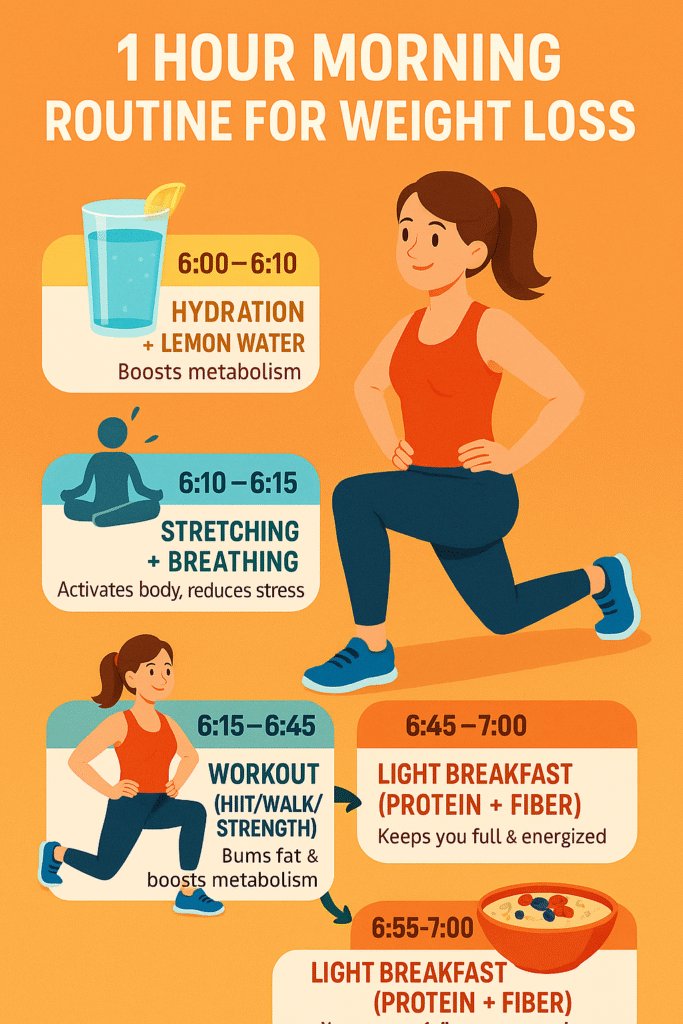The 10-Minute Morning Jog: A Science-Based Look at How It Transforms Your Body and Mind – Starting your day with just 10 minutes of jogging may seem like a small change, but science shows it can trigger remarkable transformations throughout your body and mind. This brief morning ritual activates a cascade of biological processes that continue to benefit you hours after you’ve showered and started your day. Let’s explore the evidence-based benefits of this simple yet powerful habit.
Metabolism Acceleration and Weight Management
Faster Metabolism and Weight Management
Jogging in the morning gives your metabolism an early boost, helping your body burn calories more efficiently throughout the day.
Scientific Evidence:
A study in the International Journal of Obesity found that morning exercise, even for short durations, increases fat oxidation and helps with weight control.
Scientific Research
Research published in the British Journal of Nutrition found that people who exercised before eating burned up to 20% more fat than those who exercised after eating.
What Happens to Your Body?
- Your body starts using fat stores as an energy source, promoting weight loss.
- Insulin sensitivity improves, which helps in maintaining stable blood sugar levels.
- Your resting metabolic rate remains elevated even after the jog, leading to more calorie burn throughout the day.
Tip:
For maximum fat-burning, jog on an empty stomach in the morning (fasted cardio) and stay hydrated. However, if you feel lightheaded, consider a small protein-rich snack before your run.
Cardiovascular Health Improvements
Heart Health Boost
Those 10 minutes of jogging strengthen your heart muscle and improve overall cardiovascular function.
Scientific Evidence:
According to research published in the Journal of the American College of Cardiology, even short bouts of running significantly reduce cardiovascular disease risk. The study found that runners had a 30% lower risk of all-cause mortality and a 45% lower risk of cardiovascular mortality compared to non-runners.
What Happens to Your Body?
- Your heart muscle becomes stronger and more efficient at pumping blood.
- Blood vessels become more elastic and blood pressure tends to decrease.
- Levels of HDL (good cholesterol) increase while LDL (bad cholesterol) decreases.
Tip:
Monitor your heart rate during your jog. For cardiovascular benefits, aim to reach about 70-80% of your maximum heart rate (calculated as 220 minus your age) during your 10-minute jog.
Mental Clarity and Cognitive Enhancement
Brain Fog Clearing
Morning jogging releases neurochemicals that improve focus, memory, and cognitive performance throughout the day.
Scientific Evidence:
Research from the University of British Columbia found that regular aerobic exercise, like jogging, increases the size of the hippocampus, the brain region involved in verbal memory and learning.
What Happens to Your Body?
- Increased blood flow to the brain delivers more oxygen and nutrients.
- Brain-derived neurotrophic factor (BDNF) levels rise, promoting neural growth and connections.
- Levels of dopamine, serotonin, and norepinephrine increase, improving mood and cognitive function.
Tip:
For enhanced cognitive benefits, vary your jogging route. Novel environments stimulate the brain more effectively than familiar ones, according to research in the journal Neuron.
Stress Reduction and Emotional Regulation
Cortisol Management
Morning jogging helps regulate the body’s stress hormone patterns, setting you up for better emotional stability.
Scientific Evidence:
A study in the journal Psychoneuroendocrinology demonstrated that morning exercise helps regulate cortisol levels, which naturally peak in the morning. This regulation can lead to improved stress management throughout the day.
What Happens to Your Body?
- Exercise triggers the release of endorphins, natural mood elevators.
- Cortisol levels—which naturally spike in the morning—become more balanced.
- Anxiety and depression symptoms may decrease with regular morning exercise.
Tip:
Practice mindful jogging by focusing on your breathing and surroundings. This combines the benefits of exercise with meditation, further enhancing stress reduction according to research in the Journal of Health Psychology.
Improved Sleep Quality and Circadian Rhythm
Better Sleep Architecture
Morning jogging can help regulate your body’s internal clock, leading to improved sleep quality.
Scientific Evidence:
Research in the journal Sleep Medicine Reviews found that morning exercise, particularly when done outdoors with exposure to natural light, helps synchronize circadian rhythms and improve sleep quality.
What Happens to Your Body?
- Exposure to morning light while jogging helps regulate melatonin production.
- Your body temperature naturally rises during exercise and then falls later, promoting better sleep.
- Consistent morning exercise reinforces your body’s natural sleep-wake cycle.
Tip:
Try to jog outdoors rather than on an indoor treadmill. Natural light exposure during morning exercise has been shown to be particularly effective at regulating circadian rhythms and improving sleep quality.
Immune System Strengthening
Enhanced Immune Function
Regular morning jogging can boost your body’s natural defense mechanisms.
Scientific Evidence:
A study published in the Journal of Sport and Health Science found that moderate-intensity exercise, like jogging, stimulates the immune system and may help reduce the risk of upper respiratory tract infections.
What Happens to Your Body?
- Increased circulation helps immune cells patrol the body more efficiently.
- Moderate exercise triggers the production of macrophages, which attack harmful bacteria.
- The temporary rise in body temperature during exercise may help fight infection.
Tip:
Avoid overtraining, which can temporarily suppress immune function. A gentle 10-minute jog is ideal for immune benefits without risking overexertion.
Energy Levels and Productivity Increase
Sustainable Energy Boost
Morning jogging provides more sustainable energy throughout the day compared to caffeine.
Scientific Evidence:
Research in the journal Physiology & Behavior found that regular morning exercise increases energy levels and reduces fatigue more effectively than caffeine alone.
What Happens to Your Body?
- Mitochondria (cellular power plants) increase in number and efficiency.
- Blood circulation improves, delivering more oxygen and nutrients to cells.
- The brain releases dopamine and norepinephrine, chemicals that enhance alertness.
Tip:
If you’re new to morning jogging, start with a brisk walk and gradually incorporate jogging intervals. This progressive approach allows your body to adapt and maximize energy benefits.
Long-Term Health Benefits and Longevity
Lifespan Extension
Consistent morning jogging can contribute to a longer, healthier life.
Scientific Evidence:
A landmark study published in Progress in Cardiovascular Diseases found that runners have a 25-30% lower risk of all-cause mortality compared to non-runners, and just 5-10 minutes of running per day was associated with markedly reduced risks of death from all causes and cardiovascular disease.
What Happens to Your Body?
- Telomeres (protective caps on chromosomes) may lengthen, slowing cellular aging.
- Systemic inflammation decreases, reducing risk of chronic diseases.
- Bone density improves, reducing fracture risk as you age.
Tip:
Consistency is key for longevity benefits. It’s better to jog for 10 minutes every morning than to do an hour-long run once a week. Set a realistic schedule that you can maintain long-term.
Getting Started: Practical Implementation
Habit Formation
Turning morning jogging into a consistent habit requires strategic planning and gradual progression.
Scientific Evidence:
Research in the European Journal of Social Psychology suggests that it takes an average of 66 days for a new habit to become automatic, though this can vary from 18 to 254 days depending on the individual.
Tip:
Use the “habit stacking” technique: attach your morning jog to an existing habit, such as putting on your running shoes immediately after brushing your teeth. According to behavior scientists, this increases the likelihood of maintaining the new habit.
Conclusion
A 10-minute morning jog might seem like a small commitment, but the science clearly demonstrates its powerful impact across multiple body systems. From metabolism and cardiovascular health to brain function and emotional well-being, this simple habit creates a ripple effect of positive changes throughout your day and life.
Remember that consistency matters more than intensity—those 10 minutes, when repeated regularly, can transform your health in ways that far exceed the time investment. As with any new exercise routine, consult with a healthcare provider before starting, especially if you have pre-existing health conditions.
By lacing up those running shoes each morning, you’re not just moving your body—you’re setting yourself up for a day of enhanced performance, improved mood, and better health. That’s an impressive return on a 10-minute investment.

